|
|
|
Sort Order |
|
|
|
Items / Page
|
|
|
|
|
|
|
| Srl | Item |
| 1 |
ID:
146815
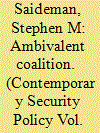

|
|
|
|
|
| Contents |
The effort to degrade and defeat the Islamic State is like many other multilateral military efforts – characterized by widely varying contributions to the effort. This article seeks to understand the patterns of contributions. Three sets of explanations are applied: the lessons of Afghanistan and Libya, variations in how potential contributors feel the threat posed by the Islamic State, and domestic political dynamics. While there may be some political processes that overlap with the big lessons and with the threat of the Islamic State, the patterns of contributions thus far suggest that the key drivers of reactions to the Islamic State are the desire not to repeat Afghanistan combined with some impetus provided by Islamic State attacks in the various homelands. The conclusion suggests some policy implications as well as some ideas for future research.
|
|
|
|
|
|
|
|
|
|
|
|
|
|
|
|
| 2 |
ID:
163756
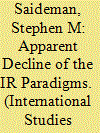

|
|
|
|
|
| Summary/Abstract |
Have the major international relations paradigms declined as much as has been asserted? Some scholars view paradigmatic theory and theory in general as on the decline as hypothesis-testing now apparently dominates published research. Such scholars argue that professionalization provides disincentives to theorize. This article demonstrates that these arguments are based on perceptions rather than on the data, on speculation about what professionalization incentivizes and how that influences research production. This article examines several datasets to consider these assertions. The article addresses what is being published, how scholars see themselves and the field, and what is being cited. Because scholars are publishing more articles compared to in the 1980s, the changes that some scholars have observed about the decline of certain approaches and the rise of others are relative and not absolute. A closer examination of the data reveals that what is perceived to be the normal pattern of theoretical output was an outlier in the mid-1990s and that pure theory development has always been a niche enterprise. To explain the trends, rather than stressing the impact of professionalization of the discipline, the article proposes an alternative process that focuses less on structure and more on agency. Social movements aimed to increase the publication of diverse theories and methodologies may have simply been effective: new journals are publishing more and more diverse articles, fostering a wider range of work. The article concludes by exploring the implications of the patterns of theory development in published IR research.
|
|
|
|
|
|
|
|
|
|
|
|
|
|
|
|
| 3 |
ID:
088742
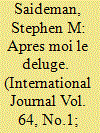

|
|
|
| 4 |
ID:
146485
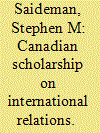

|
|
|
|
|
| Summary/Abstract |
This article examines the Canadian data collected by the Teaching, Research and International Policy project to assess the state of Canadian international relations scholarship. The focus is on the divide, mentioned but not studied in previous work, between the higher profile PhD programs (UBC, McGill, Toronto) and other Canadian universities. The results indicate that the approaches, methods, and theoretical inclinations differ less than often averred, but that the two groups do value different scholars, journals, and presses. And there is more diversity within each side than often argued, which makes the divide itself less deep. The article concludes with some implications about the possibility of a distinctively Canadian international relations.
|
|
|
|
|
|
|
|
|
|
|
|
|
|
|
|
| 5 |
ID:
111741
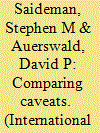

|
|
|
|
|
| Publication |
2012.
|
| Summary/Abstract |
The North Atlantic Treaty Organization is the most robust and deeply institutionalized alliance in the modern world, yet it has faced significant problems in running the International Security Assistance Force (ISAF) in Afghanistan. Specifically, the coalition effort has been plagued by caveats: restrictions on what coalition militaries can and cannot do. Caveats have diminished the alliance's overall effectiveness and created resentment within the coalition. In this article, we explain why ISAF countries have employed a variety of caveats in Afghanistan, focusing on the period from 2003 to 2009. Caveats vary predictably according to the political institutions in each contributor to ISAF. Troops from coalition governments are likely to have caveats. Troops from presidential or majoritarian parliamentary governments tend, on average, to have fewer caveats, but specific caveats depend on the background of key decision makers in those countries. To demonstrate these points, we first review key limitations facing military contingents in Afghanistan. We then compare the experiences of Canada, France, and Germany and find that our institutional model does a better job of explaining the observed behavior than do competing explanations focusing on public opinion, threat, or strategic culture. We conclude with implications for both research and North Atlantic Treaty Organization's future.
|
|
|
|
|
|
|
|
|
|
|
|
|
|
|
|
| 6 |
ID:
069891


|
|
|
|
|
| Publication |
2005.
|
| Summary/Abstract |
Secessionist groups, if they are to achieve their goal of independence, require both domestic and international support, although neither is easy to obtain. One strategy that such groups may pursue is the use of their identity to gain support both at home and abroad. What causes leaders of a secessionist movement to focus on one identity over another and why do these identities change over time? How much flexibility do elites have in making these choices? This article explores the ways in which latent identities simultaneously constrain and empower secessionist groups in achieving their political ambitions. We argue that the leaders of such groups engage in "identity layering" to achieve statehood for their region. Two cases, the Eritrean and Macedonian secessionist movements, are used to illustrate both the logic of identity layering and the dilemmas it entails. The central argument is that the configuration of constraints in each case largely determines the identities that are selected and layered onto the group in question. The use of such identities may also generate resistance-from within the secessionist entity or from outside-which in turn creates incentives for identity change. This analysis shows, first, that territorial identities (as opposed to ethnic or ideological ones) tend to serve as the group's primary mobilizational base, and second, that domestic imperatives weigh more heavily than international pressures in determining the success of these choices.
|
|
|
|
|
|
|
|
|
|
|
|
|
|
|
|
| 7 |
ID:
078496
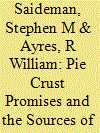

|
|
|
| 8 |
ID:
166602
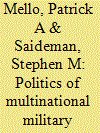

|
|
|
|
|
| Summary/Abstract |
Today, few countries fight alone; most fight as allies or partners in multilateral campaigns. The end of the Cold War opened a window of opportunity for multinational military operations (MMOs). These have seen varying degrees of participation, enthusiasm, and success. This special forum is devoted to the politics of multilateral warfare including their formation, maintenance, and durability. The introduction sketches past research and derives some key questions of continuing relevance. The contributions shed light on the domestic and international politics of MMOs, focusing on the implementation of national restrictions and their repercussions for MMOs, party politics of military intervention, the conditions under which states decide to defect from military operations, and the role of junior partners in MMOs. In sum, this forum offers a fresh look at the politics of MMOs, including conceptual contributions to the study of national restrictions, domestic constraints, and coalition warfare.
|
|
|
|
|
|
|
|
|
|
|
|
|
|
|
|
| 9 |
ID:
079908
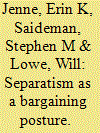

|
|
|
|
|
| Publication |
2007.
|
| Summary/Abstract |
Why do some minorities seek affirmative action while others pursue territorial autonomy or secession, given similar conditions at the substate level? This article attempts to unpack the puzzle of minority radicalization, focusing on group claim-making as an important dynamic that has been overlooked by much of the recent quantitative literature on ethnic conflict. To address this gap, the authors introduce a new `claims' variable, which codes the demands made by groups in the Minorities at Risk dataset for three five-year periods from 1985 to 2000. The authors examine the relationship between minority claim-making and rebellion and conclude that they are similar but distinct forms of group mobilization. Groups use claims as a means of bargaining with the center; relative power, therefore, has a critical influence on the extremity of demands that groups advance against the government. The authors test this model against alternative arguments using ordinal logit analysis and find that factors related to strategic power - including a history of autonomy, outside military support, and territorial concentration - are all positively correlated with a group's propensity to advance more extreme demands. This study shows that minorities with greater power vis-à-vis the center are more likely to both rebel and mobilize around separatist demands. However, minority rebellion - unlike separatist claims - may also be triggered by group deprivation, indicating that violent resistance may be driven by grievances as well as opportunities
|
|
|
|
|
|
|
|
|
|
|
|
|
|
|
|
| 10 |
ID:
152504
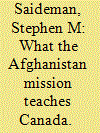

|
|
|
|
|
| Summary/Abstract |
This paper considers some of the lessons that can be drawn from Canada’s experience in Afghanistan. It focuses not just on the military but also on the rest of the government, two prime ministers, the opposition, the media, and the public. While the primary lesson might be “do not do this kind of thing again,” there are other lessons to draw that apply to Canada’s foreign and defence policies every day.
|
|
|
|
|
|
|
|
|
|
|
|
|
|
|
|
| 11 |
ID:
164404
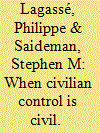

|
|
|
|
|
| Summary/Abstract |
This study introduces a new type of oversight in civil-military and executive-legislative relations: community policing. Building on principal-agent theory, this type of oversight emphasises trust rather than confrontation. To illustrate how community policing functions, the study examines how legislative oversight of military affairs operates in Belgium and New Zealand. Legislative defence committees in both countries rely on trust when overseeing the executive’s handling of defence affairs. This allows these committees to perform their oversight function at low cost in terms of time and effort, but with a high degree of access to information. Community policing therefore combines the strengths of recognised ‘police patrol’ and ‘fire alarm’ oversight, while avoiding their respective weaknesses. However, since it relies on a higher degree of trust and cooperation between the principal and agent, community policing is inherently fragile.
|
|
|
|
|
|
|
|
|
|
|
|
|
|
|
|
|
|
|
|
|